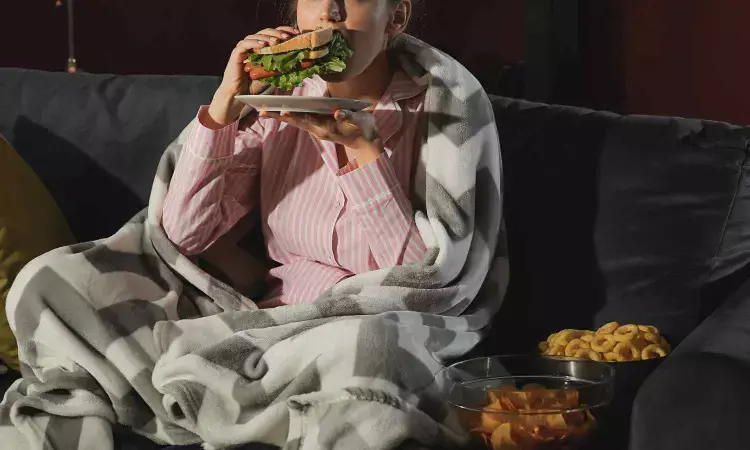- Home
- Medical news & Guidelines
- Anesthesiology
- Cardiology and CTVS
- Critical Care
- Dentistry
- Dermatology
- Diabetes and Endocrinology
- ENT
- Gastroenterology
- Medicine
- Nephrology
- Neurology
- Obstretics-Gynaecology
- Oncology
- Ophthalmology
- Orthopaedics
- Pediatrics-Neonatology
- Psychiatry
- Pulmonology
- Radiology
- Surgery
- Urology
- Laboratory Medicine
- Diet
- Nursing
- Paramedical
- Physiotherapy
- Health news
- Fact Check
- Bone Health Fact Check
- Brain Health Fact Check
- Cancer Related Fact Check
- Child Care Fact Check
- Dental and oral health fact check
- Diabetes and metabolic health fact check
- Diet and Nutrition Fact Check
- Eye and ENT Care Fact Check
- Fitness fact check
- Gut health fact check
- Heart health fact check
- Kidney health fact check
- Medical education fact check
- Men's health fact check
- Respiratory fact check
- Skin and hair care fact check
- Vaccine and Immunization fact check
- Women's health fact check
- AYUSH
- State News
- Andaman and Nicobar Islands
- Andhra Pradesh
- Arunachal Pradesh
- Assam
- Bihar
- Chandigarh
- Chattisgarh
- Dadra and Nagar Haveli
- Daman and Diu
- Delhi
- Goa
- Gujarat
- Haryana
- Himachal Pradesh
- Jammu & Kashmir
- Jharkhand
- Karnataka
- Kerala
- Ladakh
- Lakshadweep
- Madhya Pradesh
- Maharashtra
- Manipur
- Meghalaya
- Mizoram
- Nagaland
- Odisha
- Puducherry
- Punjab
- Rajasthan
- Sikkim
- Tamil Nadu
- Telangana
- Tripura
- Uttar Pradesh
- Uttrakhand
- West Bengal
- Medical Education
- Industry
Late eating is associated with impaired glucose metabolism, suggests study

Our metabolic processes differ depending on the time of day and many of them are more active in the morning than in the evening. Although studies show that eating late in the day is associated with an increased risk of obesity and cardiovascular diseases, little is known about how the time when we eat affects glucose metabolism and to what extent this is genetically defined. Prof. Olga Ramich from the German Institute of Human Nutrition Potsdam-Rehbrücke (DIfE) and her team recently investigated this in a twin cohort. The article was published in the journal eBioMedicine.
The circadian system is a hierarchically structured 24-hour time control system in the body that regulates behavior and metabolism via a central clock in the brain and peripheral clocks in organs such as the liver or pancreas. As a result, our metabolic processes differ depending on the time when we eat, which leads to diurnal fluctuations in glucose metabolism and the release of hormones after a meal. Food intake itself acts as an important timer that synchronizes our internal clocks. Decoupling meal times from the natural light-dark rhythm, e.g. when working at night, can lead to an internal clock disorder and negative metabolic changes.
Does late eating make you ill?
Previous studies have shown that eating late at night is associated with an increased risk of obesity and cardiovascular diseases.
However, little is known about how exactly the timing of food intake interacts with the individual circadian rhythm and thus influences glucose metabolism and the risk of diabetes. It is also unclear which mechanisms determine one’s individual eating behavior, as it depends on the interaction of cultural, personal, physiological and genetic factors.
Circadian Timing of Eating
When someone eats during the course of a day in relation to the individual biological daily rhythm is measured as the interval between mealtime and the midpoint of sleep. The midpoint of sleep describes the time that lies exactly in the middle between falling asleep and waking up. It is a measure of the chronotype – in other words, whether someone is an early riser or a night owl.
NUtriGenomics Analysis in Twins (NUGAT) Study
The NUGAT study, initiated and designed by Prof. Andreas F. H. Pfeiffer, was conducted from 2009 to 2010 at the German Institute of Human Nutrition Potsdam-Rehbrücke (DIfE). The identical and fraternal twin pairs were recruited either from a twin register (HealthTwiSt, Berlin, Germany) or via public advertisements. The 92 participants (46 pairs of twins) underwent two nutritional interventions, which were not relevant to the study results shown here though.
The participants underwent detailed metabolic phenotyping, which included a physical examination, medical history, anthropometric measurements and a glucose tolerance test. The individual chronotype was determined by means of a questionnaire. In addition, all 92 test subjects filled out handwritten food logs in which they noted the start and end of each meal as well as the amount and type of food consumed on five consecutive days. This included three working days and two days off to reflect the eating habits of the twin pairs.
Reference:
Vahlhaus, Janna et al., Later eating timing in relation to an individual internal clock is associated with lower insulin sensitivity and affected by genetic factors, EBioMedicine, DOI: 10.1016/j.ebiom.2025.105737.
Dr Kamal Kant Kohli-MBBS, DTCD- a chest specialist with more than 30 years of practice and a flair for writing clinical articles, Dr Kamal Kant Kohli joined Medical Dialogues as a Chief Editor of Medical News. Besides writing articles, as an editor, he proofreads and verifies all the medical content published on Medical Dialogues including those coming from journals, studies,medical conferences,guidelines etc. Email: drkohli@medicaldialogues.in. Contact no. 011-43720751


